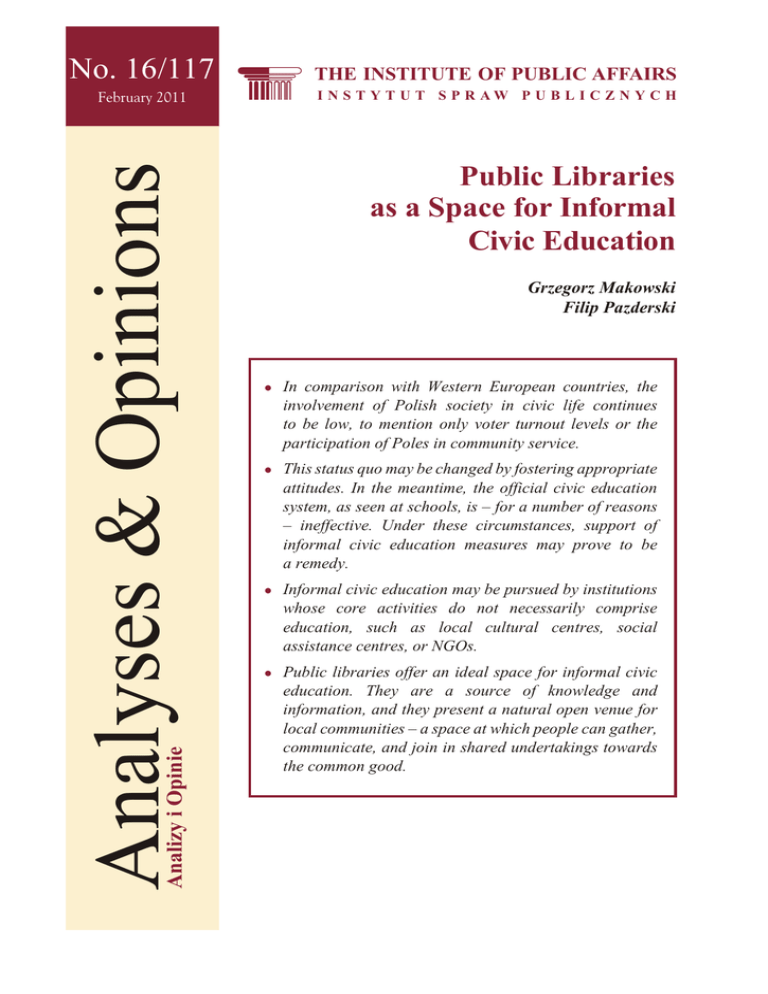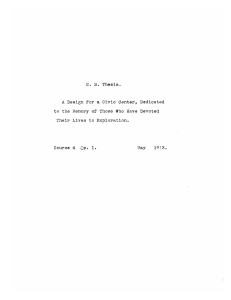s n oi ni
advertisement

THE INSTITUTE OF PUBLIC AFFAIRS February 2011 I N S T Y T U T S P R AW P U B L I C Z N Y C H Analizy i Opinie Analyses & Opinions No. 16/117 Public Libraries as a Space for Informal Civic Education Grzegorz Makowski Filip Pazderski l In comparison with Western European countries, the involvement of Polish society in civic life continues to be low, to mention only voter turnout levels or the participation of Poles in community service. l This status quo may be changed by fostering appropriate attitudes. In the meantime, the official civic education system, as seen at schools, is – for a number of reasons – ineffective. Under these circumstances, support of informal civic education measures may prove to be a remedy. l Informal civic education may be pursued by institutions whose core activities do not necessarily comprise education, such as local cultural centres, social assistance centres, or NGOs. l Public libraries offer an ideal space for informal civic education. They are a source of knowledge and information, and they present a natural open venue for local communities – a space at which people can gather, communicate, and join in shared undertakings towards the common good. 2 Public Libraries as a Space for Informal Civic Education I n its essence, citizenship amounts to participation in a political community defined in reference to the bond between individuals and the state. To a large extent, the durability of this bond depends on the degree to which a given individual feels the need to work together with other people, groups, and institutions. What’s more, this need is not given once and for all – it must bust be cultivated on an ongoing basis. This is the role of socialisation in general and, in specific, of civic education – of shaping attitudes through inculcation of the information and knowledge necessary for people to function as active, responsible entities who are aware of their rights as well as of their duties vis a vis democratic society and the state and who are capable of establishing and maintaining relations with the state and with their fellow citizens. For almost twenty years, Poland has been undergoing intensive social transformation. This has also had an impact on the sense of belonging to a political community and on how it is developed in individuals. One of the challenges now facing Poland lies in intensifying these transformations, as provided for, among other sources, in the report entitled Polska 2030. Wyzwania rozwojowe1 (Poland 2030. Challenges for Growth) commissioned by the Polish government. This challenge can not be addressed, however, without commitment at the grassroots level – without tapping the energies of citizens at the most basic levels of social organisation. Public libraries stand to play a tremendous role in this process. They are cultural and educational institutions with strong roots in their local communities, and – at approximately 8,500 nationwide – they are present in practically every local self-government body. The instrument which public libraries can bring to bear in civic animation of the local community is comprised in activities from the informal civic education category. We now proceed to a discussion of the possibilities for pursuing such educational activity at public libraries. So what is informal civic education all about ? A t the outset, a more detailed explanation of the very concept of informal civic education should be in order. To begin with a general frame of reference, the term “education” usually connotes the official system of learning spanning the successive levels from pre-school to universities. Accordingly, “education” is first and foremost associated with measures addressed to the young. In light of the issues of interest to us here, however, we need to recalibrate this definition in favour of a broader one. And, thus, experts and researchers who work with civic education issues distinguish between three basic types of education: ¢ Formal civic education – overlapping with the “common” definition of education, carried on within the educational system and directed at children and youth; ¢ Non-formal civic education – pursued in an organised manner, but outside the educational system (for instance by NGOs); may be directed at all age groups; ¢ Informal civic education – pursued in a deliberate fashion, but – usually – outside any system, and not necessarily as part of the core activities of the specific entities offering it. Informal education may be pursued by institutions for which education is not part of their basic mission (e.g. social assistance centres, jobs centres, libraries, cultural centres, private enterprises) and, again, it may be directed at all age groups. 1 Polska 2030. Wyzwania rozwojowe, Warsaw, July 2009, pp 2–3 – http://www.zds.kprm.gov.pl/userfiles/ PL_2030_wyzwania_rozwojowe.pdf [access: 4 November 2010]. Institute of Public Affairs Analyses & Opinions, 16/117 Public Libraries as a Space for Informal Civic Education 3 This formulation of informal civic education has been drawn up by researchers from Eurostat. For purposes of the present analysis, however, we propose a slightly broader approach. First of all, informal education as such is, by its very nature, a process which continues throughout our whole lives. As time goes on, each one of us assumes new societal roles, proceeds through successive stages of the formal educational system and of our professional careers, acquires new skills / qualifications or perfects previous ones. We learn all the time, and at every occasion. Thanks to new technologies, we are immersed in – not to say inundated by – information; we have access to media from all around the world and in all languages, we can read any books and watch any television shows we choose – not to mention the internet. We travel more often, and to more exotic locales. All this adds to our life experience and to our knowledge of the world. In this paper, we argue that civic knowledge and civic skills can be gained in the same general way – as it were, “by the way”, as we go about various other tasks and activities. In its broadest meaning, then, informal civic education may be thought of as an intended, but not necessarily planned or organised process which runs its course outside the official educational system in which the individual gains the knowledge and skills enabling her/him to maintain and strengthen her/his ties with the polity and with other members of society. Informal civic education and the shortcomings of formal civic education in Poland F ormal civic education in Poland is essentially limited to social studies / civic knowledge instruction offered to secondary school pupils. The teachers who lead these classes are not necessarily well prepared to offer instruction on these topics; all to often, they are actually specialised in teaching all and sundry other subjects and find themselves teaching social studies / civic knowledge courses because they were pressed into service, and they have little inclination or possibility to further their qualifications in this particular area. Precious little is done to increase this inclination – to encourage these teachers to develop their skills in teaching the young about how they ought to develop their relationship with the polity, how to exercise their rights, fulfil their duties and play an active role in public life2. And, after all, we are talking about civic education within a purely scholastic framework, nothing more. As we discuss the failings of the formal model of civic education in Poland, it is worth noting how, in this respect, schools cooperate with other institutions (such as NGOs or libraries) only to a limited extent. Formal civic education is basically confined to the educational system and does not venture outside. Another point which merits mentioning is that there are no national civic education programmes for secondary schools or universities, let alone for adult education courses. In like spirit, civic education does not seem to weigh too heavily on the minds of Polish decision makers, and it is only rarely that it surfaces in the public discourse. In juxtaposition with, say, the model in place in Germany (where teaching citizens to act to the benefit of a democratic state is a mission and a major political priority), the Polish solutions in the realm of civic education hardly add up to a system. Despite these shortcomings, analysis of the available results of international comparative studies indicates – perhaps surprisingly – that Poland is actually doing a fair job in fostering 2 Please refer to Edukacja obywatelska w Polsce i w Niemczech, ed. K.E. Siellawa-Kolbowska, A. £ada, J. Æwiek-Karpowicz, Institute of Public Affairs, Warsaw 2008. Analyses & Opinions, 16/117 Institute of Public Affairs 4 Public Libraries as a Space for Informal Civic Education civic attitudes among her citizens. Over the years 2004–2005, a study of in-school civic education systems was conducted, commissioned by the European Commission at the recommendation of the Dutch Presidency of the Council3. The report published in the wake of this study indicates that, when compared to other countries, the quality of civic education at Polish educational institutions is quite decent, even if it is a little quaint in nature, focused as it is on narrowly defined patriotic values and attitudes as well as on theoretical knowledge of the “thou shalts” and “thou shalt nots” at the formal level of a democratic state’s operation. So, one is tempted to conclude that the situation isn’t all that bad. Yet the cold, hard facts and the results of other studies gauging the state of civil society in Poland paint a less rosy picture. Suffice it to consider how Poles behave during elections. The fact that, during the parliamentary elections held in Poland in 2007, more than 53% of eligible voters stepped forward to take part was taken as a cause for happiness. In Sweden, by contrast, turnout during the most recent parliamentary elections exceeded 80%. Leaving the national level and looking at elections to the local self-governments, council elections elicit considerably less excitement among Poles. In 2006, turnout for the local self-government elections just barely reached 45%. In 2010, turnout was similar during the first round of voting (just over 47%) and fell considerably during the second round, down to 35%. And participation in nationwide referenda – that basic form of direct democracy – is nothing less than pathetic; of the four referenda held after 1989, in most cases, the minimum turnout of 50% was not achieved and the vote was thus invalid. The only positive stand-out in this context is the referendum from 2003 in which Poles voted on accession to the European Union; voter turnout reached 58%, although ballot booths were kept open for two consecutive days in what was a one-time solution designed to boost voter participation. Participation in elections and referenda is, if you will, the very salt of democracy – a basic right extending to every citizen which that citizen ought to exercise is she / he wants to somehow shape the surrounding political reality. Voting is a ritual which binds the democratic political community in the same way that joining in a religious service contributes to the togetherness of the faithful; we do well to worry when voter turnout drops below 50% much in the same way that a religious leader is worried when he finds himself preaching in a half-empty temple. To the preacher, plunging attendance is a signal that his flock is losing faith in religious dogma. In the political sphere, falling numbers of active voters bespeak a certain dispiritedness and loss of trust in the bedrock values of the democratic state. Malaise of civic society in Poland is also testified to by the results of studies of the activity levels of Poles in the public sphere. As we consider the civic-mindedness, or otherwise, of a society, a key indicator is that of trust; it is hard indeed to imagine good relations between the individual and the state if people do not trust each other or the institution of the state. According to the Social Diagnosis from 2009, only 13% of the respondents agreed with the statement that “most people can be trusted”, making for but a small increase since the previous editions of the study held over the years 2003 through 2007. In other words, this deficit of trust amounts to an ingrained feature of Polish society and, absent a concentrated effort, it will not go away anytime soon. Other data related to the condition of civil society in Poland likewise fails to impress. Citizenship, among its other elements, concerns a readiness to make an effort for the common good, for instance through self-organisation, social / volunteer work, or philanthropy. In the meantime, according to a CBOS survey from 2010, only 20% of Poles admit to having in any way contributed to the life and work of their village, town, or parish. 3 Please refer to Citizenship Education at School in Europe, Eurydice, Brussels 2005. Institute of Public Affairs Analyses & Opinions, 16/117 Public Libraries as a Space for Informal Civic Education 5 These are hardly figures characteristic of a vibrant civil society or a strong civic culture. Poles are not in the habit of joining in organisations and working together towards any common goals. Also, they do not display the hallmarks of an internally organised society connected to its institutions. As much is clear from the outside. But these symptoms also have a less manifest underpinning – this dearth of civic activity must be caused by a weakness of attitudes, value systems, and norms. This is the case even though the studies of the Polish educational system, as summarised above, indicate that formal civic education is fairly robust, teaching young Poles about the hows and whys of their state and of civil society. There thus arises the conclusion that the formal civic education system fulfils the formal minimum as regards providing youth with the bare facts about operation of basic democratic institutions, but it does not inspire in them a desire to partake in them. They leave school without the attitudes, values, and convictions which they might translate into civic activity in practice, in their daily lives. Simply put, the formal civic education system in Poland is ineffective. Seeing as it is ill equipped to shape citizens who harbour strong convictions about the meaning of democracy and actively exercise their rights and discharge their duties as citizens, there arises the need to consider other solutions, such as informal civic education. Non-governmental organisations and public institutions – examples of venues and forums for informal civic education O ne could point to at least a few areas of societal life in which civic education may be practiced with especial ease, thus strengthening civil society. The area of operations of non-governmental organisations constitutes a natural habitat for informal civic education. The very process of establishing an organisation and contributing to its work amounts to hands-on civic instruction for those who are willing to make that effort. People who set out to found an association, for instance, soon receive object lessons in concepts of paramount importance in a democracy, such as “consensus” or “compromise”, and learn how to make decisions within their group and to appoint governing bodies for representing that group vis a vis other parties. All the knowledge and skills accruing to an association’s members in the course of its operation are a classic example of informal civic education. The third sector is a place where people learn civic skills almost in spite of themselves. But there are more such places. To consider the sphere of operation of public institution, at every nexus of the state and the citizen – as the public sector is – there appears a unique opportunity for informal civic education. Even when the citizen must appear at a public authority to attend to some mundane piece of business – renew her driver’s license, pay his taxes etc – she / he must have a rudimentary feel for her / his rights and duties and dispose of a basic knowledge about administrative acts, such as writing a simple application. The citizen ought to be aware of his rights and of the duties of the state officials so that he may establish an appropriate relationship with the state – the main point of civic education. The citizen should be competent with the rudimentary instruments of the application, the complaint, and the petition – the basic forms of interacting with state authorities. How do we cause people to make better, and more frequent, use of these institutions? The educational value is comprised in the possibility of gaining such knowledge and skills spontaneously – through day-to-day interactions with the state authorities. If the public Analyses & Opinions, 16/117 Institute of Public Affairs 6 Public Libraries as a Space for Informal Civic Education administration is to serve in such an informal civic education capacity, it must adopt a user-friendly attitude; its employees should not only make administrative decisions and affix official seals, but also seek to instruct citizens and to ease their contacts with the state (which these employees represent). Such an approach rests on interdisciplinary premises. In its context, it might be suggested that the existing institutions subordinated to the public administration – the offices, libraries, or social aid centres – take measures geared at social integration and, at the same time, at civic education. In practice, this would mean that the hypothetical qualified social worker would no longer be “merely” an official or a specialist in her/his narrow field, but also an educator. Her / his official duty will no longer be limited to assisting individuals or families so as to keep them above the minimum subsistence level; she / he will also affirm them in the belief that society and the state still need them and that they should try to raise themselves out of the exclusion zone also because, once they do, they will be in a position to better avail themselves of their civic rights. Civic education at libraries can proceed along the same general lines. Libraries, after all, are centres of information and knowledge, and education in the general sense is writ large in their mission. The idea is to tweak this educational aspect in the service of civic education. Local public libraries and their role in informal civic education Libraries are predestined and preordained to serve an informal civic education role – for at least two reasons. First, the public institution formula, at least at the conceptual level, means that the library is an open place, accessible to all. Second, its public (as the name implies) character means that it is a nexus of individual and state. When you think about it, it really doesn’t take much to render the public library a place in which the reader enjoys the books and magazines and, at the same time, improves her/his civic skills. In order for libraries to shoulder this new societal role, they must first become the target of specific measures for doing away with certain negative phenomena now affecting them. To achieve this, there must be an attitude shift on the part of the Ministry of Culture and National Heritage (which is responsible for coordinating their work), and appropriate legal frameworks and structures must be put in place. Attracting the mass public to libraries may prove difficult without interest on the part of decision makers, who must be convinced to regard librarians as bona fide partners with a real role to play in their active revolution. Only if librarians benefit from appropriate programmes and legal regulations – and from a renewed faith in the value and prestige of their work – can librarians be expected to embark on proactive measures propagating their initiatives among the public. Also, librarians will require access to training designed from the perspective of informal civic education through which they can acquire or improve their skills, most particularly with respect to fulfilling the function of animators in their local communities. The library space itself and its correct arrangement will also be important. As matters stand at the moment, many public libraries lack the necessary space and computer equipment needed for effective discharge of their new role within the community. Institute of Public Affairs Analyses & Opinions, 16/117 Public Libraries as a Space for Informal Civic Education 7 There is also the unavoidable issue of improving the remuneration disbursed to employees of the sector, which is now quite low, and of guaranteeing financial stability to libraries. Problems with access to regular financing at the needed level makes it impossible for these institutions to formulate long-term strategies of the sort necessary to ensure sustained development and to attract new members of the public. The modest funds now available are insufficient to cover new initiatives as well as current operations, leaving many libraries with an all-pervading fear as to their future. If libraries are to become effective informal civic education centres, finally, librarians ought to consolidate as a professional group and build up a platform for cooperation with other entities active at the local level. There is insufficient horizontal interaction between various local community actors such as NGOs, schools, and public institutions, and a concerted effort by public libraries in this area would be most welcome. Such horizontal relations could be built up by organising meetings, workshops, and discussion forums bringing together representatives of different vocational groups (a debate between librarians, NGO workers, and local self-government officials might be a good start). Only such an exchange of information and comparison of notes offers hope for devising the most effective solutions which duly address the needs of all those concerned. Such cooperation should rely on a healthy give-and-take, with everybody benefitting from their shared effort. Once they are fortified through measures of the sort discussed above, libraries will be ready to take up a new role in local communities – with respect to informal civic education as well as to other functions. The civic education element would include, in particular: ¢ Activising and strengthening local communities so as to educate a citizenry which is well-informed and aware of its rights as well as its duties and has a good sense of its territorial and societal identity. Towards this end, libraries could pursue projects geared at exploring and documenting the local identity and at getting a better feel for the workings of democracy and of civil society; ¢ Providing a neutral, open space available to every member of the community, a venue for actions and undertakings aimed at development of the local community and with a participatory character. The library might be affiliated with an animal shelter, a local newspaper, or an internet portal providing coverage of the community and its life; ¢ Providing a space for action by people with various needs, such as silent study areas, cafes, inexpensive printing and scanning facilities, or internet hot-spots; ¢ Making the local public library a venue for debates bringing together representatives of the local self-government, local personages, outside experts, and guests – such discussions would serve the internal integration of the community and integrate it; ¢ Serving as information centres enabling access to objective sources of knowledge – offering books, periodicals, and free-of-charge internet as well as staff who are ready to help members of the public use them; ¢ Building partnerships with local public institutions, non-governmental organisations, members of the business community, and informal civic groups (libraries should not embark on new initiatives on their own). Libraries are the perfect ambassador for such actions; ¢ Greater involvement of local community members by drawing them into cooperation with the library, also on a volunteer basis (not only in the context of special projects or events, but also of their day-to-day operations). Analyses & Opinions, 16/117 Institute of Public Affairs Grzegorz Makowski – holds a PhD in sociology, senior analyst and head of the Civil Society Programme at the Institute of Public Affairs. Since 2003, involved in the KOMPAS project devoted to fostering a friendly legal and institutional environment for NGOs. Cooperated with the anti-corruption programme of the Stefan Batory Foundation and the Helsinki Foundation for Human Rights; author of numerous publications and articles for leading periodicals. Filip Pazderski – lawyer and sociologist, coordinator of volunteerism and civic education projects for the Civil Society Programme at the Institute of Public Affairs, author of expert studies and publications in both his chosen fields. Since 2003, actively involved in work towards fostering civil society, protection of human rights, and propagating inter-cultural dialogue in collaboration with Polish and international NGOs. Analyses & Opinions No. 16/117 Analyses & Opinions is a series of policy briefs highlighting pressing issues and presenting policy recommendations. This series is prepared with the support of Trust for Civil Society in Central and Eastern Europe. This article was written as part of the “Local Libraries as Civic Education Centres in Europe” project pursued by the Institute of Public Affairs with funding from the Robert Bosch Stiftung and the Information Society Development Foundation, with the Bundeszentrale für politische Bildung (bpb) and the Networking European Citizenship Education involved as project partners. The above analysis summarises the key observations and recommendations formulated in the course of two meetings held as part of the project – “Public libraries as centres for civic education in Europe: recommendations for new practices and perspectives in the Polish libraries” (devoted to exchange of experiences with civic education work among animators from different European countries) and “Librarians’ roundtable” (for employees of Polish public libraries). For more information about the project, please visit http://www.isp.org.pl/biblioteki. The Information Society Development Foundation is pursuing the Library Development Programme with the goal of facilitating access to computers, the internet, and to relevant training for Polish public libraries. The Library Development Programme in Poland is a joint undertaking of the Bill and Melinda Gates Foundation and the Polish-American Freedom Foundation. Series Editor: Dr. Jacek Kucharczyk Series Coordinator: Rafa³ Za³êski *More issues of Analyses & Opinions are available in the Polish versions at www.isp.org.pl Copyright Fundacja Instytut Spraw Publicznych Non-commercial reproduction of this publication or its excerpts is permitted only with the acknowledgement of the source. With questions and comments please write to publikacje@isp.org.pl Address: 5 Szpitalna St., # 22, 00-031 Warsaw, Poland e-mail: isp@isp.org.pl; www.isp.org.pl







